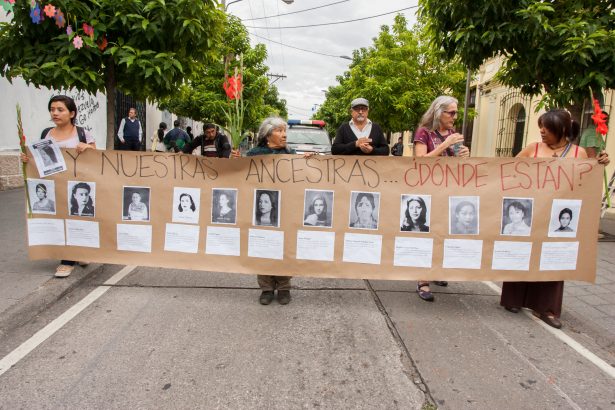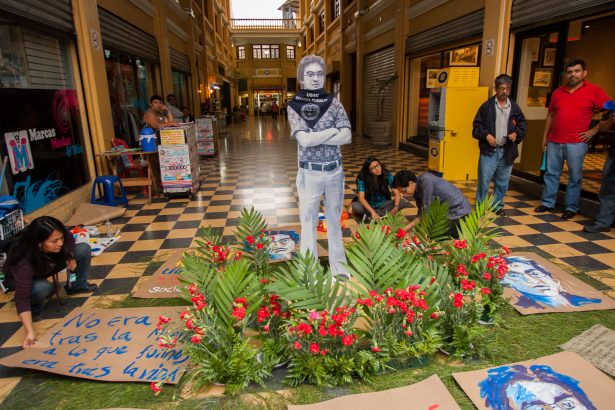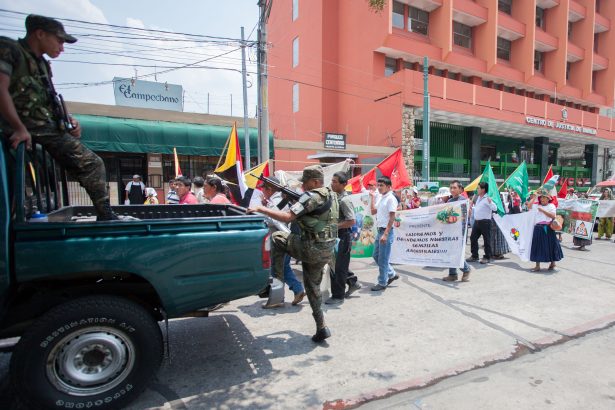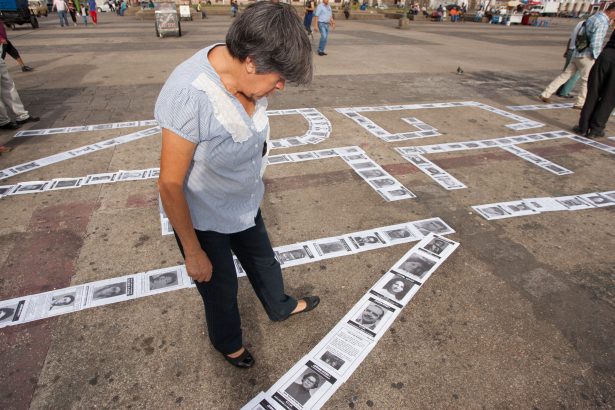
Nearly every corner of Guatemala City tells the story of tragedy from 36 years of internal armed conflict that gripped the country from 1960-1996. The entrance to the Portalito Bar in the historic center, where Enersto “Ché” Guavera used to drink during his time in Guatemala, contains a plaque denoting the spot where student leader Oliverio Castañeda de Leon was assassinated by the Guatemalan military. Another plaque further up the street demarks where Myrna Mack, a Guatemalan anthropologist, was assassinated near San Sebastian Park. Eight years later, Archbishop Juan Gerardi was bludgeoned to death in the church that sits in front of the park.
These spots are reminders of the violence that fell upon Guatemala during the long dark days of the war. But these markers of historical memory have not stopped the oligarchy and military elite from trying to rewrite the history of the war.
December 29, 2016 marks the 20th anniversary of the signing of the peace accords that brought an end to the fighting. These 20 years are marked by historic revision, and the remilitarization of Guatemalan society. But a small group of activists organized under the umbrella group Sons and Daughters for Identity and Justice Against Oblivion and Silence, or HIJOS in the Spanish acronym, has sought to retain the historic memory, push back against the post-war militarization, and challenge the neoliberal project that has accelerated since the war.
“There was never a full recognition of what was done by the military [during the war] in the last 20 years,” said Francisco Sanchez, one of the founding members of HIJOS. “We began to question the discourse of reconciliation that [foreigners and non-governmental organizations] were trying to impose. We began to generate a space for people to rediscover their history, and to create our own agenda.”
He added, “At that time it cost us a lot to talk about what happened during the war. Many responded that we couldn’t talk about what was done during the war, and that ‘we have to continue constructing the peace.’ But today, 20 years after the end of the war, the topic is a much more active debate.”
Guatemala HIJOS is loosely connected with other HIJOS groups in Latin America. But despite carrying the same name, the groups are all autonomous.
The group emerged at an important time in Guatemalan history. The collective was founded two years after the signing of the peace accords. At that time, reforms were suggested by the peace accords, and Archbishop Gerardi was assassinated after the church published the report on historic clarification on the crimes committed during the war. The group also carried out its first actions following the publishing of the secret military diary that documented the campaign of forced disappearances, which still continues to inspire their quest for historic memory.
The group has taken various direct actions over the years, including blocking military parades, infiltrating military zones, as well as organizing forums to discuss the history. They especially have worked to share the recent history with the youth of the country, who rarely receive the whole story in school.
Linking the struggle against neoliberalism and militarism
Their work has also included challenging of the neoliberal model that was imposed upon the country through the peace accords.
“Many look at us as an organization or a space that is only anti-military,” Sanchez said. “But we also identify ourselves to be anti-imperialist as well. We have identified that behind the national security programs that have been implemented across Latin America is the United States, as well as the old oligarchies. For us, the only time when Guatemala can advance as a society is when the military disappears.”

This has led them to connect with indigenous communities that are struggling against the dispossession of land by transnational companies.
According to Sanchez, the conflict became one of the greatest indigenous rebellions in the country’s history, and the response of the dictators and the state was the genocide against the indigenous peoples. “The genocide was not the end, but rather the middle of the imposing of a model of capitalist accumulation based on exportation and the exploitation of natural resources,” he explained. “It is not coincidence that after the peace accords, the state generated all the legislation that permitted the entrance of transnational companies that today generate great conflict.”
The group has also worked to bring awareness of the struggles of the rural indigenous communities to the urban centers.
“We are also trying join the struggles of indigenous communities,” Sanchez said. “The counterinsurgent plan has returned at a time when the indigenous communities are questioning the model of accumulation. Today there are more indigenous leaders imprisoned for defending their territory than members of the military imprisoned for the crimes they committed.”
The group has received numerous threats and attacks for their activism. In 2004, the group suffered from a series of attacks on their collective housing that stole musical and sound equipment, and computers. There have also been threats made against the lives of members.
These threats increased during the trial against former dictator Efrain Ríos Montt, who stood trial for the genocide against the indigenous Ixil people. HIJOS stood with the Ixiles in demanding that the former dictator be found guilty for the violence of the counterinsurgency.
In 2013, Ríos Montt was found guilty of genocide. But a week later the charge was overturned, and the Guatemalan congress declared, “there was no genocide.” HIJOS in response began painting “Si Hubo Genicido,” or “There was Genocide,” across Guatemala City.
HIJOS’ work today is especially important, as the Guatemala military has slowly creeped back into everyday life, and as former military officials have found their way back into government, and work for the transnational companies that are evicting the communities from their land.
The militarization of post-war Guatemala
The 20 years since the signing of the peace accords have been marked by the steady increase in the presence of the Guatemalan military in the day-to-day life of citizens. The accords were initially meant to limit the presence of the military in internal security, and strengthen the newly formed Guatemalan National Civilian Police. But due to the steady rise in violent crime, including homicides, gang violence and drug trafficking, it became all too common to see the military in the streets of Guatemala supporting the operations of the police.
“One of the incomplete processes of the peace accords is the reduction of the military, and its reformation into a democratic society,” Sanchez said. “On the contrary, military members continue to amass more and more power.”

In 2000, during the administration of Alonso Portillo, the Guatemalan congress signed Accord 40-2000, which permitted the Guatemalan military to support the police in operations against organized crime. The military presence has since slowly expanded into other operations. Today the military is deployed in order to provide “security” in the city centers, markets, tourist centers, and on buses and in the bio-reserves, as part of the “Green Battalion.”
The largest expansion of military presence occurred during the administration of Otto Pérez Molina, a former colonel and member of Guatemala’s elite special forces, the Kabiles. As a candidate, Pérez Molina had campaigned on the return of full military aid from the United States to the Central American country. In fact, he was able to increase military aid by 40 percent, prior to the collapse of his administration in a massive corruption scandal in 2015.
The administration also oversaw the largest increase in attacks on human rights defenders since the signing of the peace accords. According to data from United for the Defense of Human Rights Defenders, there were 409 cases of attacks on human rights defenders in 2011. By 2014, that number hit a high of 813, and then dropped to 493 in 2015.
This period also saw one of the most significant increases of militarization in regions that are normally peaceful, such as the indigenous highlands, which had suffered at the hand of the Guatemalan military during the internal armed conflict. These regions are the center of the social conflicts created by transnational companies interested in the exploitation of natural resources.
The election of Guatemala’s right-wing nationalist version of Donald Trump, Jimmy Morales, has done little to stem the expansion of the military’s presence across the country. In March 2016, Morales appeared on national television standing next to military leaders to announce the expansion of the “citizen security” program, which was implemented by the administration of Pérez Molina. The expansion will lead to a larger presence of the military across the country in order to respond to the rise in crime.
Morales utilized a campaign against corruption as a springboard to gain the presidential office. But the media turned to Morales’ relationship with the old guard of the Guatemalan military, specifically his connection to Edgar Justino Ovalle Maldonado — a former colonel who had served in special operations in Coban, where the remains of 568 indigenous victims were found in unmarked graves. The then-frontrunner downplayed these relationships, assuring the media that all parties had some relationship with the armed forces.
Former soldiers have also found their way into private security firms. This military presence has led to severely increased levels of violence in areas of social conflict.
On September 27, 2009, Adolfo Ich Chamán, a respected community leader from a small town near El Estor, Izabal, was shot and hacked to death by members of the security forces of the Guatemalan Nickel Company. In 2012, Guatemalan police arrested Mynor Padilla, the company’s head of security, who was a former colonel in the Guatemalan military. His trial has slowly advanced, but has run into numerous delays and accusations of outside influence.
Direct action and reclaiming the day of the military
HIJOS has taken direct actions to challenge the celebration of the military in the streets of Guatemala City. One such action is the yearly march to challenge the Day of the Military on June 30.
In the 11th march organized by HIJOS Guatemala, hundreds of activists turned out in the historic center to march against the militarization of their country this year.

“We are commemorating our heroes and martyrs that fell during the war fighting for a better world,” said Roberto Landaverry, a historian and popular educator. “We are trying to counter the domination of memory and that today is the day of the military. The Guatemalan military carried out the genocide, it is connected to narco-trafficking and organized crime, and it continues to violate human rights. We have nothing to celebrate today.”
In 2007, around 30 people associated with HIJOS invaded and blocked the yearly parade. According to Sanchez, this led to a national debate over the parade, and its eventual removal from the streets by the administration of Alvero Colom out of respect for the victims of the internal armed conflict. This decision was continued during the administration of Pérez Molina, in spite of the administration’s close relationship with the armed forces.
The decision to remove the military parade from the streets followed years of organizing by HIJOS. During its campaign, the group collected thousands of signatures from citizens.
In 2016, Guatemalan social media erupted in outrage towards the end of June, following President Jimmy Morales’ announcement that after the seven-year hiatus, the controversial military parade would be held in Guatemala City on July 3. A poll by the national newspaper, Prensa Libre, found that 64 percent of the population opposed the return of the military parade.
Following the massive outcry from citizens on social media and in the streets, the administration was forced to announce that it would hold the military celebration within military facilities in the capital, and not on the city streets.
In spite of this victory, Sanchez admits it is difficult to gauge the impact of the collective.
“We do not know our direct impact, to be honest,” Sanchez said. “But when we pass out fliers or have festivals, many people come to us and share their stories or say that they too had family members who were disappeared. Our actions in the streets show those who do not speak that they are not alone.”
He added, “15 years ago people were afraid to speak, but today people are beginning to speak more. We are trying to reclaim public spaces. We are trying to say that we will not forget.”
